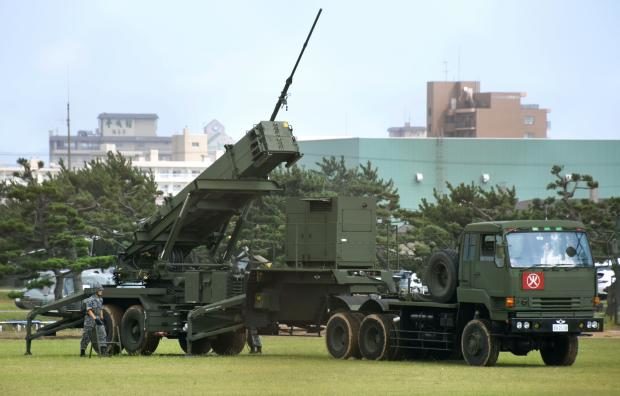
Patriot Advanced Capability-3 interceptor missile system (PAC3) is deployed at the Hakodate base of Japan’s Self-Defense Forces Tuesday, Sept. 19, 2017 in Hakodate, northern Japan. Japan is moving a mobile missile-defense system on the northern island of Hokkaido to a base near recent North Korean missile flyover routes. (Photo by Kyodo News via AP)
TOKYO — Japan on Tuesday moved a mobile missile-defense system on the northern island of Hokkaido to a base near recent North Korean missile flyover routes.
Defense Minister Itsunori Onodera said a Patriot Advanced Capability-3 interceptor unit was deployed at the Hakodate base on southern Hokkaido “as a precaution” as part of government preparations for a possible emergency.
The relocation came after a North Korean missile was test-fired last week and flew over southern Hokkaido and landed in the Pacific off the island’s east coast – the second flyover in less than a month.
The PAC-3 was brought from another base in Yakumo town on Hokkaido, about 80 kilometers (50 miles) northeast of Hakodate. The system has a range of about 20 kilometers (12 miles).
Four more of Japan’s 34 PAC-3 units, largely used to defend the capital region, were relocated to southwestern Japan recently after North Korea warned of sending missiles toward the US territory of Guam.
Japan currently has a two-step missile defense system. First, Standard Missile-3 interceptors on Aegis destroyers in the Sea of Japan would attempt to shoot down missiles mid-flight. If that fails, surface-to-air PAC-3s would try to intercept them.
Japan’s Constitution, which limits the use of force to self-defense, only allows the military to shoot down missiles that are heading to Japan, or debris falling onto Japanese territory.
Onodera has said a new security law passed in 2015 might allow it to shoot down a Guam-bound missile if it poses a critical security threat to Japan and its top ally, the United States.